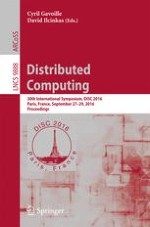2016 | OriginalPaper | Buchkapitel
Anonymity-Preserving Failure Detectors
verfasst von : Zohir Bouzid, Corentin Travers
Erschienen in: Distributed Computing
Verlag: Springer Berlin Heidelberg
Aktivieren Sie unsere intelligente Suche, um passende Fachinhalte oder Patente zu finden.
Wählen Sie Textabschnitte aus um mit Künstlicher Intelligenz passenden Patente zu finden. powered by
Markieren Sie Textabschnitte, um KI-gestützt weitere passende Inhalte zu finden. powered by
